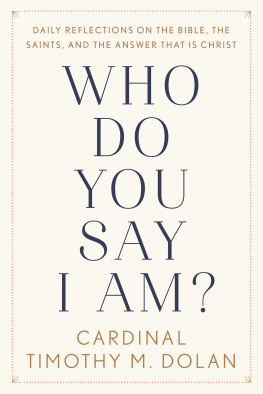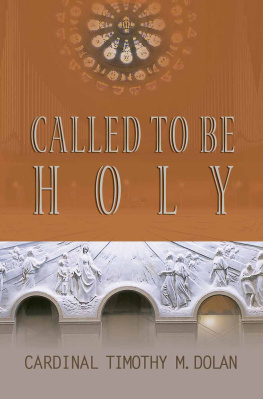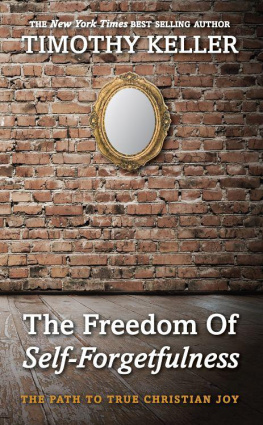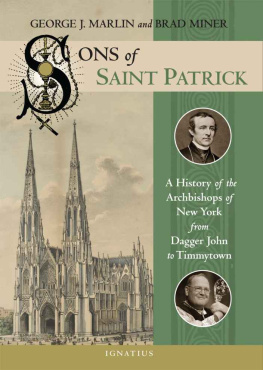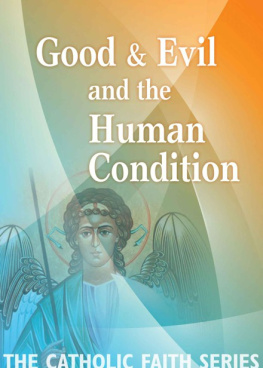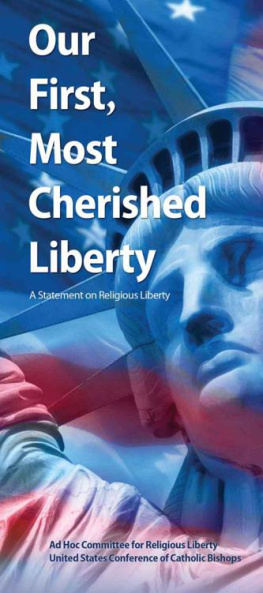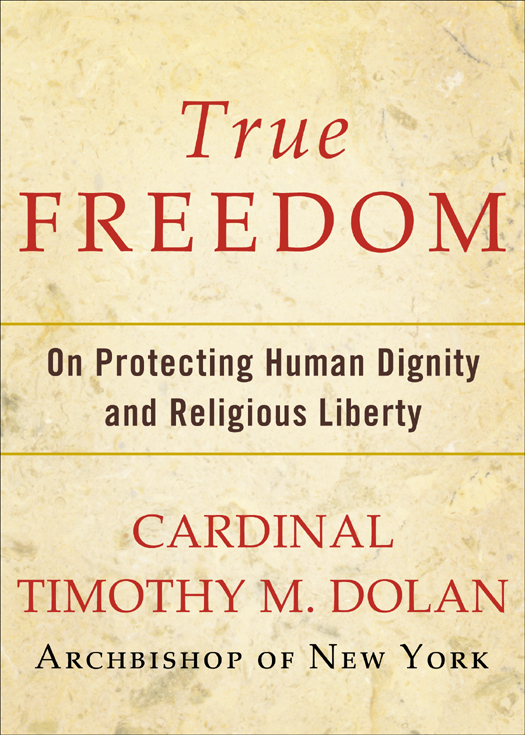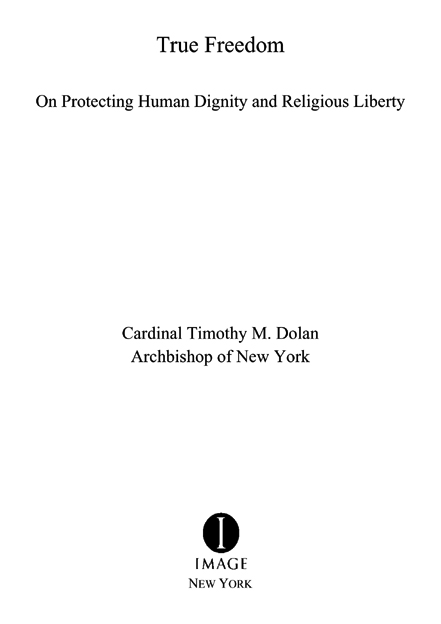Copyright 2012 by Cardinal Timothy M. Dolan, Archbishop of New York
Grateful acknowledgment is made to Image Books, an imprint of Random House, Inc., for permission to reprint the introduction from A People of Hope by John L. Allen Jr. Copyright 2012 by John L. Allen Jr.
All rights reserved.
Published in the United States by Image, an imprint of the Crown Publishing Group, a division of Random House, Inc., New York.
www.crownpublishing.com
IMAGE is a registered trademark, and the I colophon is a trademark of Random House, Inc.
Library of Congress Cataloging-in-Publication Data is available upon request.
eISBN: 978-0-385-34493-7
v3.1
Contents
True freedom is that freedom which most truly safeguards the dignity of the human person. It is stronger than any violence or injustice. Such is the freedom which has always been desired by the Church, and which she holds most dear.
Pope Leo XIII
When I was a newly ordained priest in Saint Louis, one of my weekly assignments was to visit an elderly couple who lived in the parish. Every Friday Id bring them Holy Communion and would spend some time just sitting and talking with them. The husband was severely disabled and had lost the ability to speak, and the only way he was able to communicate was through a series of blinks and eye movements. I couldnt understand him on my own, but his loving wife, who cared for him so tenderly, was able to translate. What started out as a duty quickly turned into one of my favorite times in the whole week as I got to know this couple, so obviously devoted to each other and still very much in love after many years of marriage.
One of the things that always struck me during my visits was the couples serenity, a real sense of inner peace. They always seemed very happy to see me and went out of their way to make a rookie priest feel comfortable and welcome.
After three years, I was assigned to a different parish, and I stopped by for my final Friday. I felt moved to tell them how grateful I was for their kindness to me and how much I was going to miss our weekly get-togethers. I told the wife how impressed I was by her patience and with her husband, and I told the husband what an inspiration he had been to me. In the eyes of the world, youre in bad shape, I said. Youre unable to move, unable to talk, unable to do so many of the things that most of us take for granted and consider necessary for a useful and productive life. And yet, in all the weeks that Ive been coming here, youve never once complained or asked, Why did God allow this to happen to me? Whats your secret?
His wife held his hand as he blinked out his reply, and she passed it on to me: Just to live is itself a gift from God. Every morning when I wake up I am so happy to be alive for another day that I cherish the opportunity that Ive been given.
That, to me, is still one of the best definitions of the dignity of life that Ive ever heard. It summarizes the beauty and dignity of life itself, a beauty and dignity that go beyond what were able to do, what were able to accomplish. It also gets to the heart of what Blessed John Paul II was getting at in his monumental 1995 encyclical, Evangelium Vitae, The Gospel of Life. His fundamental thesis is that human life is sacred, and thus merits dignity in and of itself, not just for what it can accomplish, achieve, or produce. John Paul II directs his teaching not just to Catholics, not just to Christians or people of faith, but to all people of goodwill. This is rather important. True enough, his teaching is expressed in terms of religious belief, but this fundamental concept of the sacredness of all human lifewhich deserves dignity, respect, and protection by lawis rooted in natural law, a source of ingrained principles accessible to all, not just religious folks.
Natural law is a concept of objective truth, known by anyone with the power of reason. For instance, it is always and everywhere wrong to deliberately take the life of an innocent person. This is an objective truth, and it is not relativized by the special interests of religious preference, class, gender, or individual bias. Natural law is also at the heart of our first freedoms declared so boldly in our nations Declaration of Independence: We hold these truths to be self-evident, that all men are created equal, that they are endowed by their Creator with certain unalienable Rights.
It is a question of endowments that are intrinsic to us by the very fact of being human. And thus the rights appropriate to us are unalienable. They cannot be taken away by any state, power, law, or choice of individuals.
And what specifically cannot be taken away? Our life, our liberty. No human institution or individual has given us these rights. They have been given to us by God.
This is what Frederick Douglass knew. This is what Abraham Lincoln knew. This is what Martin Luther King Jr. knew.
As King writes in his famous Letter from a Birmingham Jail, How does one determine whether a law is just or unjust? A just law is a man-made code that squares with the moral law or the law of God. An unjust law is a code that is out of harmony with the moral law. King then refers to a famous philosopher, from whom he learned that an unjust law is a human law that is not rooted in eternal law and natural law. Any law that degrades human personality is unjust.
The philosopher cited by Dr. King is Saint Thomas Aquinas.
Since good law is classically seen as a protector of cultures most noble values from cultures basest urges, it will not surprise this audience that John Paul spends ample time looking at contemporary culture. While no one could accuse this Polish pope of being a pessimist, he does still realistically note a variety of threats to the sacredness of human life in todays culture, such as abortion, infanticide, eugenics, the misuse of artificial reproductive technologies, contraception, and euthanasia, as well as an even broader range of dangers to human life in poverty, an unjust distribution of economic resources, war, the arms race, drugs, and human trafficking. No single issue politician was Karol Wojtyla!
For Blessed John Paul, ideas have consequences. The litany of threats mentioned in The Gospel of Life are but consequences of faulty and toxic cultural ideas, a web he famously calls the culture of death. This he defines as a culture that denies the basic solidaritythe idea that we are responsible to and for one anotherinherent in the human person and that is obsessed instead with efficiency and convenience. In rather stinging language, Pope John Paul speaks of a war of the powerful against the weak. He writes: A person who, because of illness, handicap, or, more simply, just by existing, threatens the well-being or lifestyle of those who are more favoured tends to be looked upon as an enemy to be resisted or eliminated. In this way a kind of conspiracy against life is unleashed.
Such a culture of death can only thrive, of course, in a world in which God has been excluded, and in which everyone can evade the responsibility of solidarity by claiming to define his or her own morality. Personal freedomthe ability to do what I want, when I want, because I want to do itis seen as the only absolute value.
Can sustained human rights, those unalienable rights with which we have been endowed by our Creator, girded by law, survive in such a culture? The pragmatic, utilitarian worldview, so popular in some segments of government and society, is used to construct a system of laws protecting human rights, particularly that of life itself, that are like blowing leaveseverything is constantly being renegotiated, based on shifting winds of utility, convenience, privacy, and self-interest.


